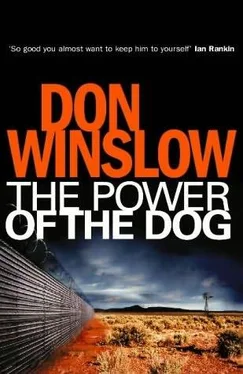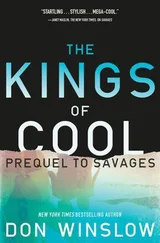Don Winslow - The Power of the Dog
Здесь есть возможность читать онлайн «Don Winslow - The Power of the Dog» весь текст электронной книги совершенно бесплатно (целиком полную версию без сокращений). В некоторых случаях можно слушать аудио, скачать через торрент в формате fb2 и присутствует краткое содержание. Жанр: Триллер, на английском языке. Описание произведения, (предисловие) а так же отзывы посетителей доступны на портале библиотеки ЛибКат.
- Название:The Power of the Dog
- Автор:
- Жанр:
- Год:неизвестен
- ISBN:нет данных
- Рейтинг книги:3 / 5. Голосов: 1
-
Избранное:Добавить в избранное
- Отзывы:
-
Ваша оценка:
- 60
- 1
- 2
- 3
- 4
- 5
The Power of the Dog: краткое содержание, описание и аннотация
Предлагаем к чтению аннотацию, описание, краткое содержание или предисловие (зависит от того, что написал сам автор книги «The Power of the Dog»). Если вы не нашли необходимую информацию о книге — напишите в комментариях, мы постараемся отыскать её.
The Power of the Dog — читать онлайн бесплатно полную книгу (весь текст) целиком
Ниже представлен текст книги, разбитый по страницам. Система сохранения места последней прочитанной страницы, позволяет с удобством читать онлайн бесплатно книгу «The Power of the Dog», без необходимости каждый раз заново искать на чём Вы остановились. Поставьте закладку, и сможете в любой момент перейти на страницу, на которой закончили чтение.
Интервал:
Закладка:
The girl doesn’t know the truth behind any of this and doesn’t care. All she knows is that Adan Barrera rescued her from a future of misery in a Mexico City brothel and chose her instead as his uncle’s companion. The gossips would have it that she resembles a woman whom Don Miguel once loved.
Which is my good fortune, the girl thinks.
Don Miguel’s demands aren’t heavy. She cooks for him, launders his clothes, accommodates his needs as a man. True, he beats her, but not as often or as viciously as her own father, and his sexual demands are not as frequent. He beats her, then screws her, and if he cannot keep his floto hard he gets angry and beats her until he can do it.
There are worse lives, she thinks.
And the money that Adan Barrera sends her is generous.
But not as generous as…
She puts the thought out of her head and presents Don Miguel with the pan de muerto.
Her hands are shaking.
Tio notices.
Her small hands quiver as she lays the bread on the table in front of him, and when he looks into her eyes they’re moist, on the verge of tears. Is it sorrow? He asks himself. Or fear? And as he looks closely into her eyes she glances down at the pan de muerto and then back up at him and then he knows.
“It is beautiful,” he says, looking down at the sweet roll.
“Thank you.”
Is there a crack in her voice? he wonders. Just the slightest hesitation?
“Please sit down,” he says, standing and holding her chair out for her. She sits down, her hands gripping the edges of the chair.
“Please, you have the first bite,” he says, sitting back down.
“Oh, no, it is for you.”
“I insist.”
“I couldn’t.”
“I insist.”
It’s a command.
She can’t disobey.
So she tears off a piece of the pan and lifts it to her lips. Or tries to, anyway-her hand shakes so badly that it has a hard time finding her mouth. And try as she might to hold them back, tears fill her eyes and then spill over, and her mascara runs down her cheeks, leaving black streaks on her face.
She looks up at him and sniffles, “I can’t.”
“And yet you would have fed it to me.”
She sniffs, but little bubbles of snot run out of her nose.
He hands her a linen napkin.
“Wipe your nose,” he says.
She does.
Then he says, “Now you must eat the bread that you baked for me.”
She blurts out, “Please.”
Then she looks down.
Are my nephews already dead? Tio wonders. Guero wouldn’t dare attempt to assassinate me unless Adan and Raul, especially, were safely out of the picture. So either they are already dead or will be soon, or perhaps Guero has botched that as well. Let us hope so, he thinks, and makes a mental note to contact his nephews at the first opportunity, as soon as this triste business is concluded.
“Mendez offered you a fortune, didn’t he?” Miguel Angel asks the girl. “A new life for you, for your whole family?”
She nods.
“You have younger sisters, do you not?” Tio asks. “Your drunk of a father abuses them? With Mendez’s money you could get them out, make them a home?”
“Yes.”
“I understand,” Tio says.
She looks up at him hopefully.
“Eat,” he says. “It is a merciful death, isn’t it? I know you wouldn’t have wanted me to die slowly and in pain.”
She balks at putting the bread in her mouth. Her hand trembles, leaving little crumbs sticking to her bright red lipstick. And now fat, heavy tears plop onto the bread, ruining the sugary frosting that she had so carefully applied.
“Eat.”
She takes a bite of the bread but can’t seem to swallow it, so he pours a glass of red wine and puts it in her hand. She sips it, and that seems to help, and she washes the bread down with it, then takes another bite and another sip.
He leans across the table and strokes her hair with the back of his hand. And softly murmurs, “I know. I know,” as with his other hand he places another piece of the bread to her lips. She opens her mouth and takes it on her tongue, then a sip of wine, and then the strychnine hits and her head snaps back, her eyes open wide and her death rattle gurgles moistly between her parted lips.
He has her body thrown over the fence to the dogs.
Parada lights a cigarette.
Sucks on it as he bends over, putting on his shoes, and wonders why he’s being awakened in the small hours of the morning, and what is this “urgent personal business” that could not wait until the sun came up. He tells his housekeeper to make the minister of education at home in the study and that he’ll be right down.
Parada has known Cerro for years. He was bishop in Culiacan when Cerro was the Sinaloa governor, and even baptized two of the man’s legitimate children. And hadn’t Miguel Angel Barrera stood as godfather on both occasions? Parada asks himself. Certainly it was Barrera who had come to him to make arrangements, both spiritual and temporal, for Cerro’s illegitimate offspring, when the governor had taken advantage of some young girl from one of the villages. Oh, well, at least they came to me as opposed to an abortionist, and that is something in the man’s favor.
But, he thinks as he pulls an old wool sweater over his head, if this is another teenage girl in an interesting circumstance, I am prepared to be seriously annoyed. Cerro should know better at his age. Certainly, he might have learned from experience if nothing else, and in any case, why does it have to be at-he glances at the clock-four in the morning?
He rings for the housekeeper.
“Coffee, please,” Parada tells her. “For two. In the study.”
Recently his relationship with Cerro has been one of alternate arguing and cajoling, begging and threatening, as he has petitioned the minister of education for new schools, books, lunch programs and more teachers. It has been a constant negotiation in which Parada has tiptoed on the edge of blackmail, once protesting to Cerro that the rural villages were not going to be treated like “bastard children”-a remark that was apparently worth two primary schools and a dozen new teachers.
Perhaps this is Cerro’s revenge, Parada thinks as he goes downstairs. But when he opens the door to his study and sees Cerro’s face, he knows it’s far more serious.
Cerro gets right to it. “I’m dying of cancer.”
Parada is stunned. “I am terribly sorry to hear this. Is there nothing…”
“No. There is no hope.”
“Would you like for me to hear your confession?”
“I have a priest for that,” Cerro says.
He hands Parada the briefcase.
“I brought you this,” Cerro says. “I didn’t know who else to bring it to.”
Parada opens it, looks at the papers and the tapes and says, “I don’t understand.”
“I have been a conspirator,” Cerro says, “in a massive crime. I cannot die… I am afraid to die… with this on my soul. I need to at least try to make restitution.”
“Certainly if you confess you will receive absolution,” Parada answers. “But if this is all evidence of some sort, why bring it to me? Why not to the attorney general, or…”
“His voice is on those tapes.”
Well, that would be a reason, Parada thinks.
Cerro leans forward and whispers, “The attorney general, the secretary of the interior, the chairman of the PRI. The president. All of them. All of us.”
Good God, Parada thinks.
What is on these tapes?
He goes through a pack and a half listening to them.
Lighting one cigarette from another, he listens to the tapes and pores through the documents. Memos of meetings, Cerro’s notes. Names, dates and places. A fifteen-year record of corruption-no, not just corruption. That would be the sad norm, and this is extraordinary. More than extraordinary-language fails.
Читать дальшеИнтервал:
Закладка:
Похожие книги на «The Power of the Dog»
Представляем Вашему вниманию похожие книги на «The Power of the Dog» списком для выбора. Мы отобрали схожую по названию и смыслу литературу в надежде предоставить читателям больше вариантов отыскать новые, интересные, ещё непрочитанные произведения.
Обсуждение, отзывы о книге «The Power of the Dog» и просто собственные мнения читателей. Оставьте ваши комментарии, напишите, что Вы думаете о произведении, его смысле или главных героях. Укажите что конкретно понравилось, а что нет, и почему Вы так считаете.












